Law and Social Theory
VerifiedAdded on 2022/12/29
|13
|3953
|21
AI Summary
This essay engages in an in-depth discussion of Foucault’s theories on governmentality, law and discipline to provide an understanding of how modern society can be regarded as a surveillance society as best rather than one that is progressive and liberal in nature.
Contribute Materials
Your contribution can guide someone’s learning journey. Share your
documents today.
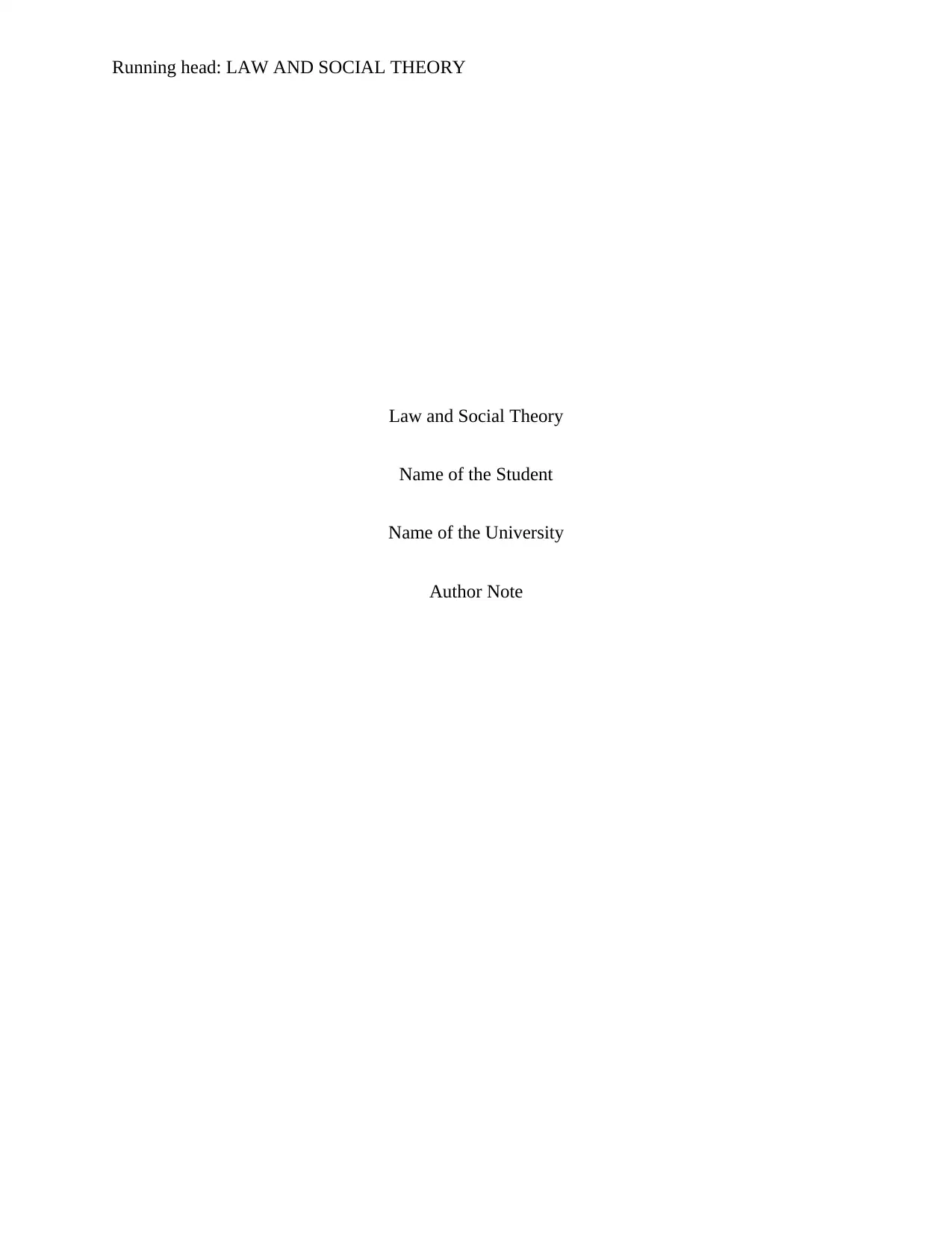
Running head: LAW AND SOCIAL THEORY
Law and Social Theory
Name of the Student
Name of the University
Author Note
Law and Social Theory
Name of the Student
Name of the University
Author Note
Secure Best Marks with AI Grader
Need help grading? Try our AI Grader for instant feedback on your assignments.
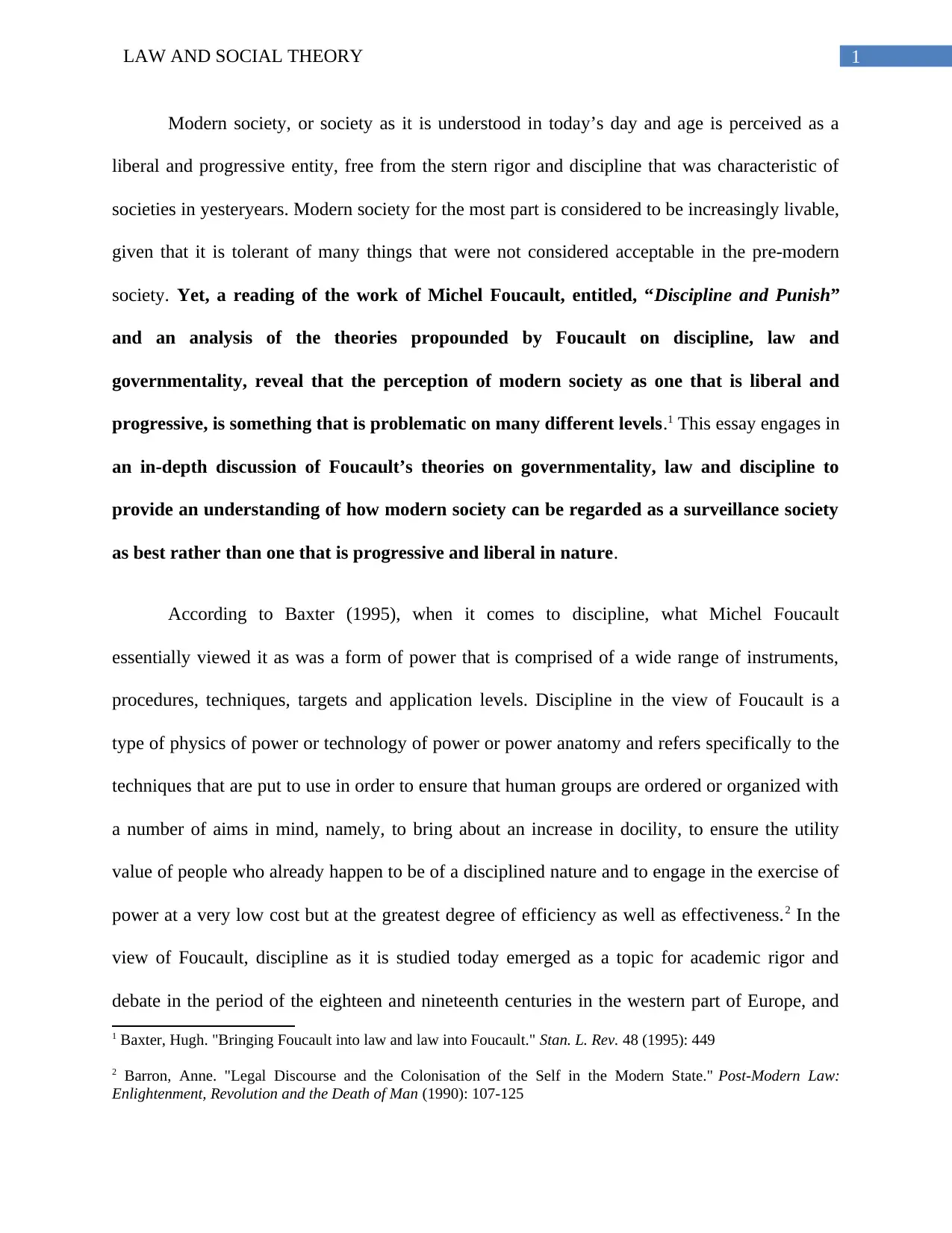
1LAW AND SOCIAL THEORY
Modern society, or society as it is understood in today’s day and age is perceived as a
liberal and progressive entity, free from the stern rigor and discipline that was characteristic of
societies in yesteryears. Modern society for the most part is considered to be increasingly livable,
given that it is tolerant of many things that were not considered acceptable in the pre-modern
society. Yet, a reading of the work of Michel Foucault, entitled, “Discipline and Punish”
and an analysis of the theories propounded by Foucault on discipline, law and
governmentality, reveal that the perception of modern society as one that is liberal and
progressive, is something that is problematic on many different levels.1 This essay engages in
an in-depth discussion of Foucault’s theories on governmentality, law and discipline to
provide an understanding of how modern society can be regarded as a surveillance society
as best rather than one that is progressive and liberal in nature.
According to Baxter (1995), when it comes to discipline, what Michel Foucault
essentially viewed it as was a form of power that is comprised of a wide range of instruments,
procedures, techniques, targets and application levels. Discipline in the view of Foucault is a
type of physics of power or technology of power or power anatomy and refers specifically to the
techniques that are put to use in order to ensure that human groups are ordered or organized with
a number of aims in mind, namely, to bring about an increase in docility, to ensure the utility
value of people who already happen to be of a disciplined nature and to engage in the exercise of
power at a very low cost but at the greatest degree of efficiency as well as effectiveness.2 In the
view of Foucault, discipline as it is studied today emerged as a topic for academic rigor and
debate in the period of the eighteen and nineteenth centuries in the western part of Europe, and
1 Baxter, Hugh. "Bringing Foucault into law and law into Foucault." Stan. L. Rev. 48 (1995): 449
2 Barron, Anne. "Legal Discourse and the Colonisation of the Self in the Modern State." Post-Modern Law:
Enlightenment, Revolution and the Death of Man (1990): 107-125
Modern society, or society as it is understood in today’s day and age is perceived as a
liberal and progressive entity, free from the stern rigor and discipline that was characteristic of
societies in yesteryears. Modern society for the most part is considered to be increasingly livable,
given that it is tolerant of many things that were not considered acceptable in the pre-modern
society. Yet, a reading of the work of Michel Foucault, entitled, “Discipline and Punish”
and an analysis of the theories propounded by Foucault on discipline, law and
governmentality, reveal that the perception of modern society as one that is liberal and
progressive, is something that is problematic on many different levels.1 This essay engages in
an in-depth discussion of Foucault’s theories on governmentality, law and discipline to
provide an understanding of how modern society can be regarded as a surveillance society
as best rather than one that is progressive and liberal in nature.
According to Baxter (1995), when it comes to discipline, what Michel Foucault
essentially viewed it as was a form of power that is comprised of a wide range of instruments,
procedures, techniques, targets and application levels. Discipline in the view of Foucault is a
type of physics of power or technology of power or power anatomy and refers specifically to the
techniques that are put to use in order to ensure that human groups are ordered or organized with
a number of aims in mind, namely, to bring about an increase in docility, to ensure the utility
value of people who already happen to be of a disciplined nature and to engage in the exercise of
power at a very low cost but at the greatest degree of efficiency as well as effectiveness.2 In the
view of Foucault, discipline as it is studied today emerged as a topic for academic rigor and
debate in the period of the eighteen and nineteenth centuries in the western part of Europe, and
1 Baxter, Hugh. "Bringing Foucault into law and law into Foucault." Stan. L. Rev. 48 (1995): 449
2 Barron, Anne. "Legal Discourse and the Colonisation of the Self in the Modern State." Post-Modern Law:
Enlightenment, Revolution and the Death of Man (1990): 107-125
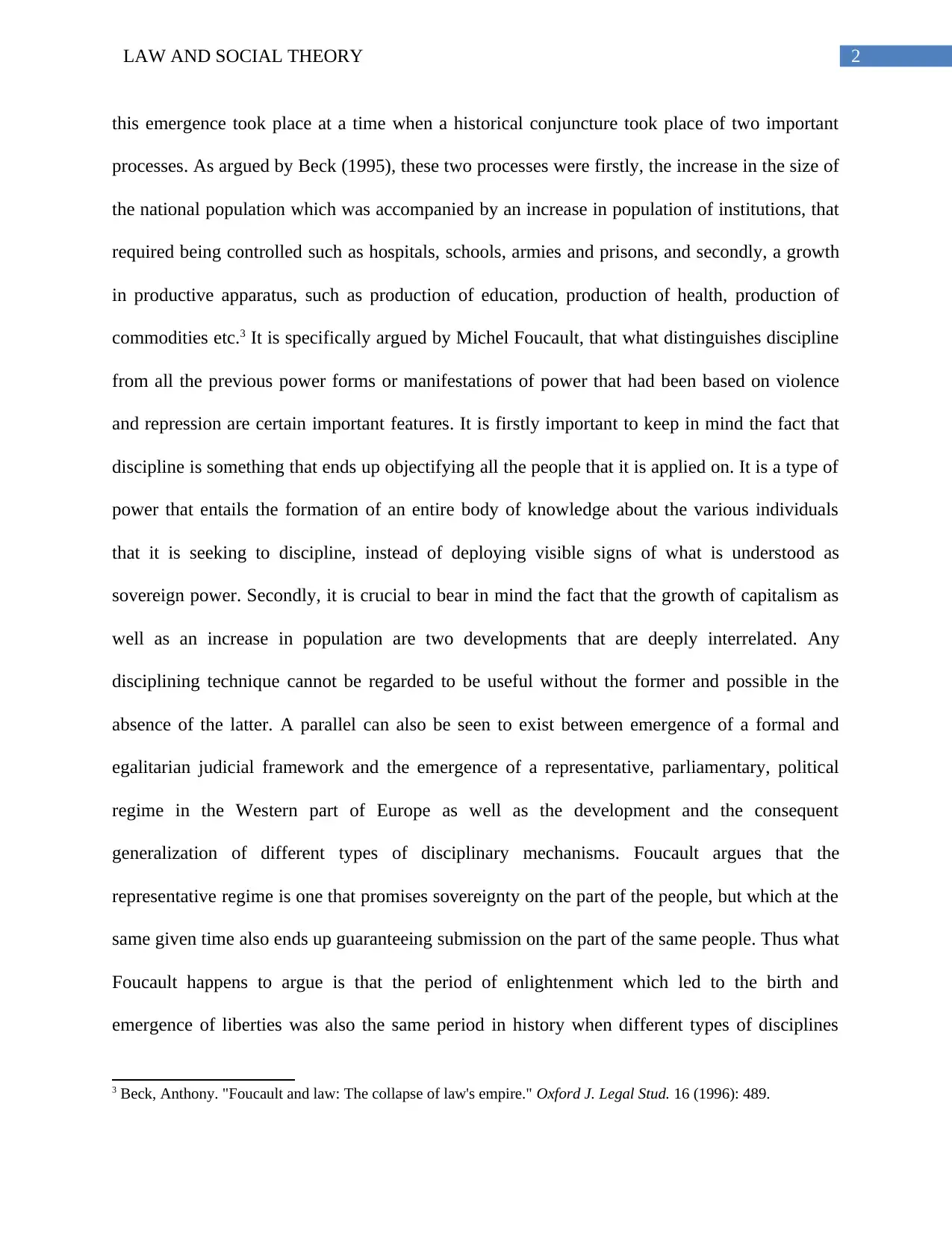
2LAW AND SOCIAL THEORY
this emergence took place at a time when a historical conjuncture took place of two important
processes. As argued by Beck (1995), these two processes were firstly, the increase in the size of
the national population which was accompanied by an increase in population of institutions, that
required being controlled such as hospitals, schools, armies and prisons, and secondly, a growth
in productive apparatus, such as production of education, production of health, production of
commodities etc.3 It is specifically argued by Michel Foucault, that what distinguishes discipline
from all the previous power forms or manifestations of power that had been based on violence
and repression are certain important features. It is firstly important to keep in mind the fact that
discipline is something that ends up objectifying all the people that it is applied on. It is a type of
power that entails the formation of an entire body of knowledge about the various individuals
that it is seeking to discipline, instead of deploying visible signs of what is understood as
sovereign power. Secondly, it is crucial to bear in mind the fact that the growth of capitalism as
well as an increase in population are two developments that are deeply interrelated. Any
disciplining technique cannot be regarded to be useful without the former and possible in the
absence of the latter. A parallel can also be seen to exist between emergence of a formal and
egalitarian judicial framework and the emergence of a representative, parliamentary, political
regime in the Western part of Europe as well as the development and the consequent
generalization of different types of disciplinary mechanisms. Foucault argues that the
representative regime is one that promises sovereignty on the part of the people, but which at the
same given time also ends up guaranteeing submission on the part of the same people. Thus what
Foucault happens to argue is that the period of enlightenment which led to the birth and
emergence of liberties was also the same period in history when different types of disciplines
3 Beck, Anthony. "Foucault and law: The collapse of law's empire." Oxford J. Legal Stud. 16 (1996): 489.
this emergence took place at a time when a historical conjuncture took place of two important
processes. As argued by Beck (1995), these two processes were firstly, the increase in the size of
the national population which was accompanied by an increase in population of institutions, that
required being controlled such as hospitals, schools, armies and prisons, and secondly, a growth
in productive apparatus, such as production of education, production of health, production of
commodities etc.3 It is specifically argued by Michel Foucault, that what distinguishes discipline
from all the previous power forms or manifestations of power that had been based on violence
and repression are certain important features. It is firstly important to keep in mind the fact that
discipline is something that ends up objectifying all the people that it is applied on. It is a type of
power that entails the formation of an entire body of knowledge about the various individuals
that it is seeking to discipline, instead of deploying visible signs of what is understood as
sovereign power. Secondly, it is crucial to bear in mind the fact that the growth of capitalism as
well as an increase in population are two developments that are deeply interrelated. Any
disciplining technique cannot be regarded to be useful without the former and possible in the
absence of the latter. A parallel can also be seen to exist between emergence of a formal and
egalitarian judicial framework and the emergence of a representative, parliamentary, political
regime in the Western part of Europe as well as the development and the consequent
generalization of different types of disciplinary mechanisms. Foucault argues that the
representative regime is one that promises sovereignty on the part of the people, but which at the
same given time also ends up guaranteeing submission on the part of the same people. Thus what
Foucault happens to argue is that the period of enlightenment which led to the birth and
emergence of liberties was also the same period in history when different types of disciplines
3 Beck, Anthony. "Foucault and law: The collapse of law's empire." Oxford J. Legal Stud. 16 (1996): 489.
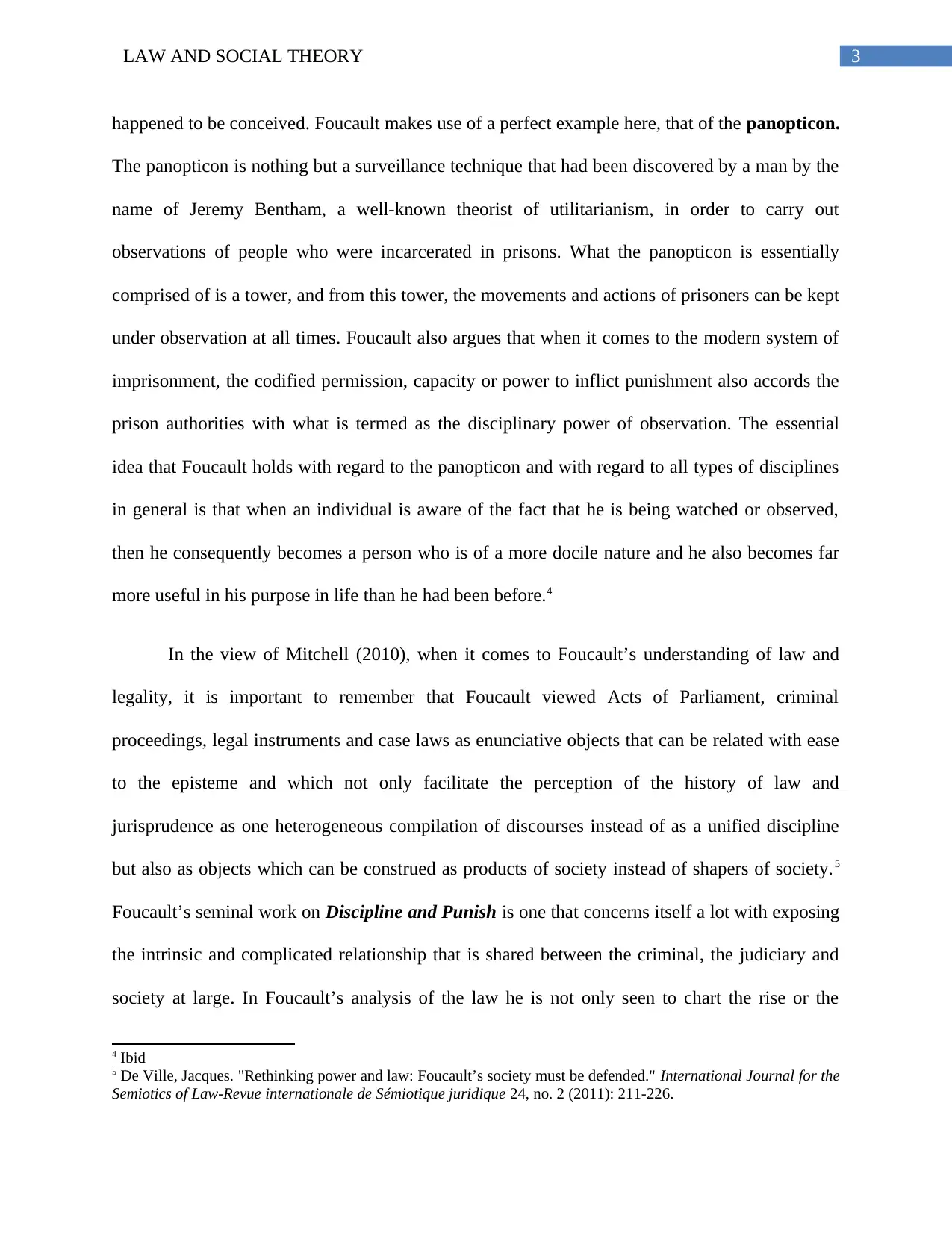
3LAW AND SOCIAL THEORY
happened to be conceived. Foucault makes use of a perfect example here, that of the panopticon.
The panopticon is nothing but a surveillance technique that had been discovered by a man by the
name of Jeremy Bentham, a well-known theorist of utilitarianism, in order to carry out
observations of people who were incarcerated in prisons. What the panopticon is essentially
comprised of is a tower, and from this tower, the movements and actions of prisoners can be kept
under observation at all times. Foucault also argues that when it comes to the modern system of
imprisonment, the codified permission, capacity or power to inflict punishment also accords the
prison authorities with what is termed as the disciplinary power of observation. The essential
idea that Foucault holds with regard to the panopticon and with regard to all types of disciplines
in general is that when an individual is aware of the fact that he is being watched or observed,
then he consequently becomes a person who is of a more docile nature and he also becomes far
more useful in his purpose in life than he had been before.4
In the view of Mitchell (2010), when it comes to Foucault’s understanding of law and
legality, it is important to remember that Foucault viewed Acts of Parliament, criminal
proceedings, legal instruments and case laws as enunciative objects that can be related with ease
to the episteme and which not only facilitate the perception of the history of law and
jurisprudence as one heterogeneous compilation of discourses instead of as a unified discipline
but also as objects which can be construed as products of society instead of shapers of society.5
Foucault’s seminal work on Discipline and Punish is one that concerns itself a lot with exposing
the intrinsic and complicated relationship that is shared between the criminal, the judiciary and
society at large. In Foucault’s analysis of the law he is not only seen to chart the rise or the
4 Ibid
5 De Ville, Jacques. "Rethinking power and law: Foucault’s society must be defended." International Journal for the
Semiotics of Law-Revue internationale de Sémiotique juridique 24, no. 2 (2011): 211-226.
happened to be conceived. Foucault makes use of a perfect example here, that of the panopticon.
The panopticon is nothing but a surveillance technique that had been discovered by a man by the
name of Jeremy Bentham, a well-known theorist of utilitarianism, in order to carry out
observations of people who were incarcerated in prisons. What the panopticon is essentially
comprised of is a tower, and from this tower, the movements and actions of prisoners can be kept
under observation at all times. Foucault also argues that when it comes to the modern system of
imprisonment, the codified permission, capacity or power to inflict punishment also accords the
prison authorities with what is termed as the disciplinary power of observation. The essential
idea that Foucault holds with regard to the panopticon and with regard to all types of disciplines
in general is that when an individual is aware of the fact that he is being watched or observed,
then he consequently becomes a person who is of a more docile nature and he also becomes far
more useful in his purpose in life than he had been before.4
In the view of Mitchell (2010), when it comes to Foucault’s understanding of law and
legality, it is important to remember that Foucault viewed Acts of Parliament, criminal
proceedings, legal instruments and case laws as enunciative objects that can be related with ease
to the episteme and which not only facilitate the perception of the history of law and
jurisprudence as one heterogeneous compilation of discourses instead of as a unified discipline
but also as objects which can be construed as products of society instead of shapers of society.5
Foucault’s seminal work on Discipline and Punish is one that concerns itself a lot with exposing
the intrinsic and complicated relationship that is shared between the criminal, the judiciary and
society at large. In Foucault’s analysis of the law he is not only seen to chart the rise or the
4 Ibid
5 De Ville, Jacques. "Rethinking power and law: Foucault’s society must be defended." International Journal for the
Semiotics of Law-Revue internationale de Sémiotique juridique 24, no. 2 (2011): 211-226.
Secure Best Marks with AI Grader
Need help grading? Try our AI Grader for instant feedback on your assignments.
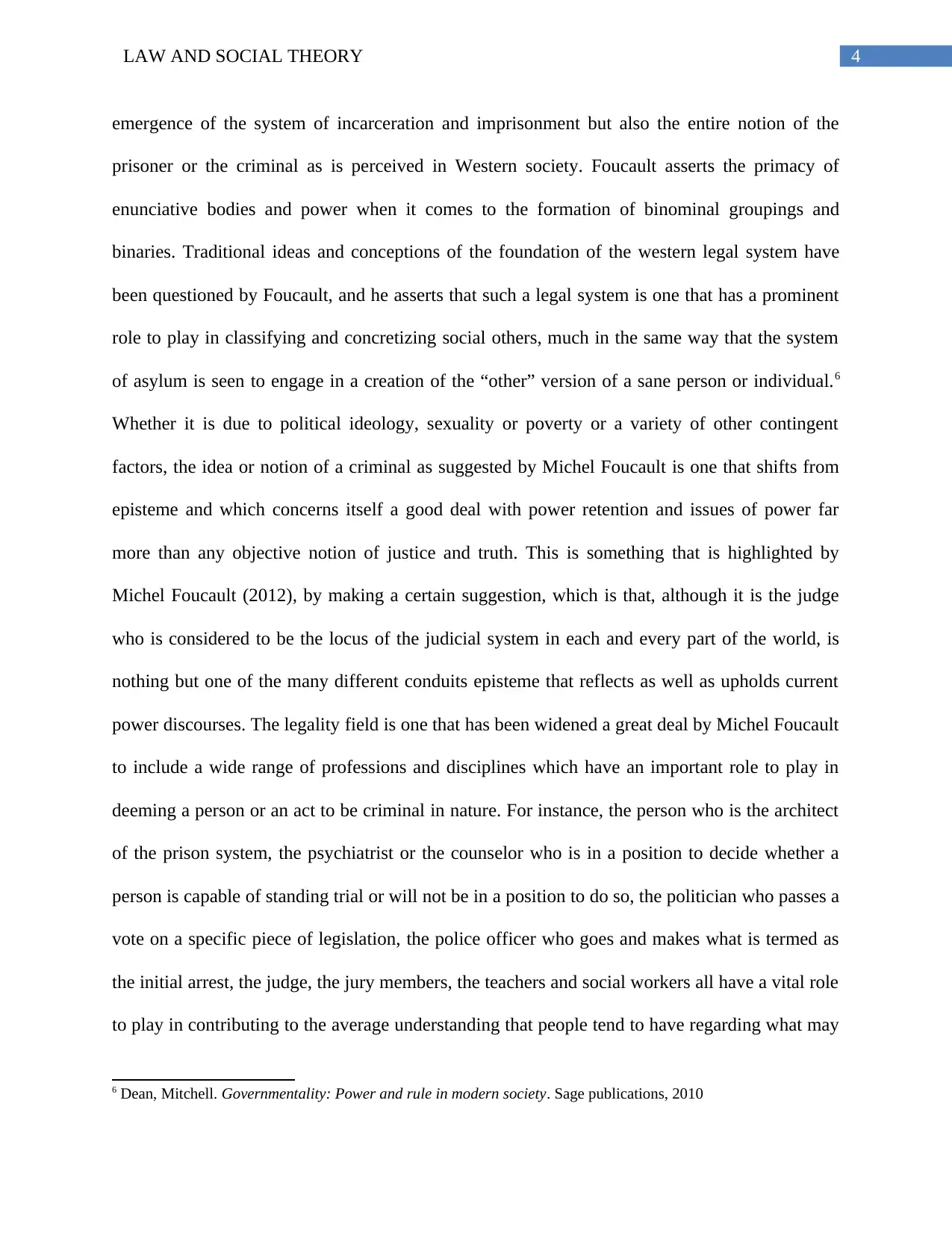
4LAW AND SOCIAL THEORY
emergence of the system of incarceration and imprisonment but also the entire notion of the
prisoner or the criminal as is perceived in Western society. Foucault asserts the primacy of
enunciative bodies and power when it comes to the formation of binominal groupings and
binaries. Traditional ideas and conceptions of the foundation of the western legal system have
been questioned by Foucault, and he asserts that such a legal system is one that has a prominent
role to play in classifying and concretizing social others, much in the same way that the system
of asylum is seen to engage in a creation of the “other” version of a sane person or individual.6
Whether it is due to political ideology, sexuality or poverty or a variety of other contingent
factors, the idea or notion of a criminal as suggested by Michel Foucault is one that shifts from
episteme and which concerns itself a good deal with power retention and issues of power far
more than any objective notion of justice and truth. This is something that is highlighted by
Michel Foucault (2012), by making a certain suggestion, which is that, although it is the judge
who is considered to be the locus of the judicial system in each and every part of the world, is
nothing but one of the many different conduits episteme that reflects as well as upholds current
power discourses. The legality field is one that has been widened a great deal by Michel Foucault
to include a wide range of professions and disciplines which have an important role to play in
deeming a person or an act to be criminal in nature. For instance, the person who is the architect
of the prison system, the psychiatrist or the counselor who is in a position to decide whether a
person is capable of standing trial or will not be in a position to do so, the politician who passes a
vote on a specific piece of legislation, the police officer who goes and makes what is termed as
the initial arrest, the judge, the jury members, the teachers and social workers all have a vital role
to play in contributing to the average understanding that people tend to have regarding what may
6 Dean, Mitchell. Governmentality: Power and rule in modern society. Sage publications, 2010
emergence of the system of incarceration and imprisonment but also the entire notion of the
prisoner or the criminal as is perceived in Western society. Foucault asserts the primacy of
enunciative bodies and power when it comes to the formation of binominal groupings and
binaries. Traditional ideas and conceptions of the foundation of the western legal system have
been questioned by Foucault, and he asserts that such a legal system is one that has a prominent
role to play in classifying and concretizing social others, much in the same way that the system
of asylum is seen to engage in a creation of the “other” version of a sane person or individual.6
Whether it is due to political ideology, sexuality or poverty or a variety of other contingent
factors, the idea or notion of a criminal as suggested by Michel Foucault is one that shifts from
episteme and which concerns itself a good deal with power retention and issues of power far
more than any objective notion of justice and truth. This is something that is highlighted by
Michel Foucault (2012), by making a certain suggestion, which is that, although it is the judge
who is considered to be the locus of the judicial system in each and every part of the world, is
nothing but one of the many different conduits episteme that reflects as well as upholds current
power discourses. The legality field is one that has been widened a great deal by Michel Foucault
to include a wide range of professions and disciplines which have an important role to play in
deeming a person or an act to be criminal in nature. For instance, the person who is the architect
of the prison system, the psychiatrist or the counselor who is in a position to decide whether a
person is capable of standing trial or will not be in a position to do so, the politician who passes a
vote on a specific piece of legislation, the police officer who goes and makes what is termed as
the initial arrest, the judge, the jury members, the teachers and social workers all have a vital role
to play in contributing to the average understanding that people tend to have regarding what may
6 Dean, Mitchell. Governmentality: Power and rule in modern society. Sage publications, 2010
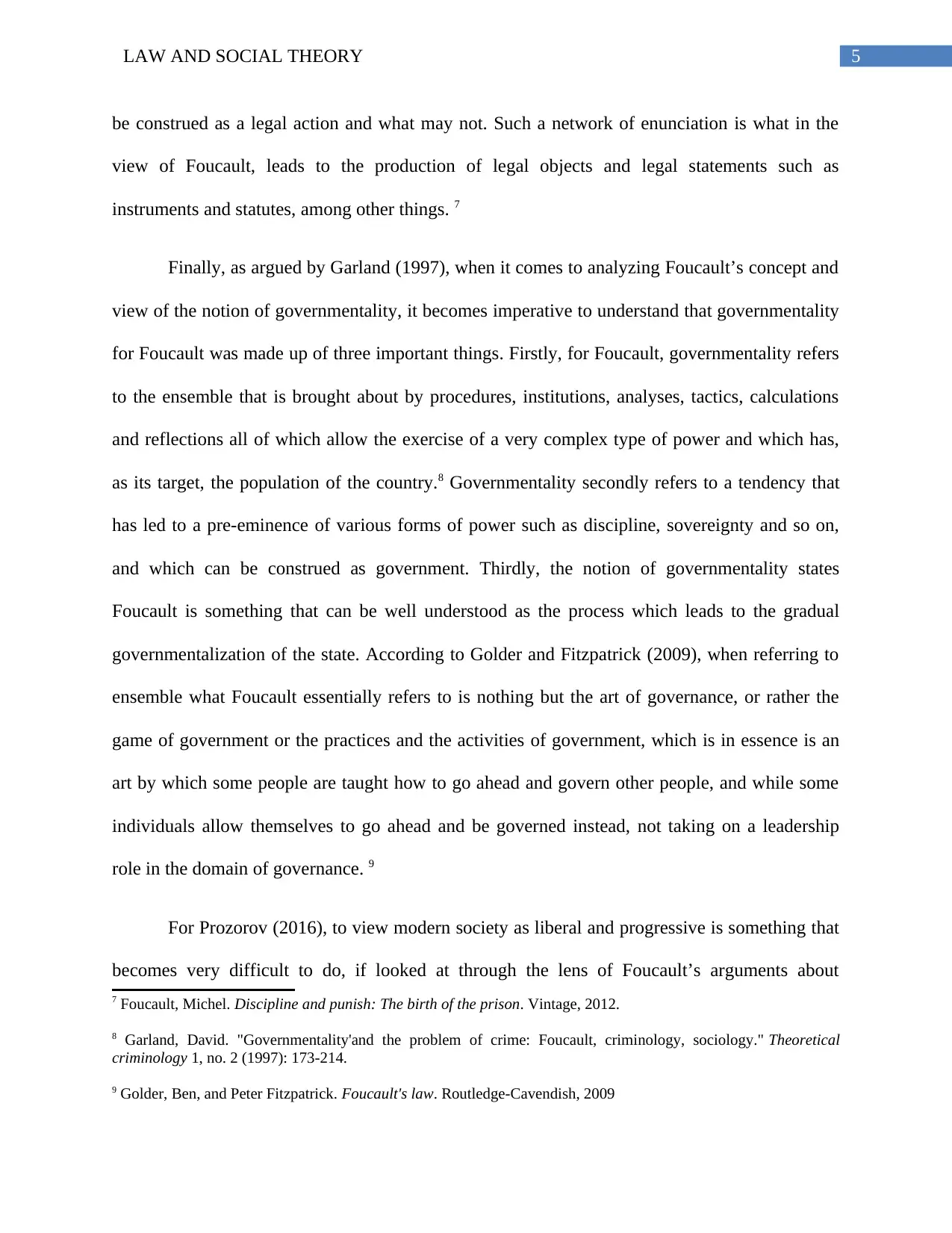
5LAW AND SOCIAL THEORY
be construed as a legal action and what may not. Such a network of enunciation is what in the
view of Foucault, leads to the production of legal objects and legal statements such as
instruments and statutes, among other things. 7
Finally, as argued by Garland (1997), when it comes to analyzing Foucault’s concept and
view of the notion of governmentality, it becomes imperative to understand that governmentality
for Foucault was made up of three important things. Firstly, for Foucault, governmentality refers
to the ensemble that is brought about by procedures, institutions, analyses, tactics, calculations
and reflections all of which allow the exercise of a very complex type of power and which has,
as its target, the population of the country.8 Governmentality secondly refers to a tendency that
has led to a pre-eminence of various forms of power such as discipline, sovereignty and so on,
and which can be construed as government. Thirdly, the notion of governmentality states
Foucault is something that can be well understood as the process which leads to the gradual
governmentalization of the state. According to Golder and Fitzpatrick (2009), when referring to
ensemble what Foucault essentially refers to is nothing but the art of governance, or rather the
game of government or the practices and the activities of government, which is in essence is an
art by which some people are taught how to go ahead and govern other people, and while some
individuals allow themselves to go ahead and be governed instead, not taking on a leadership
role in the domain of governance. 9
For Prozorov (2016), to view modern society as liberal and progressive is something that
becomes very difficult to do, if looked at through the lens of Foucault’s arguments about
7 Foucault, Michel. Discipline and punish: The birth of the prison. Vintage, 2012.
8 Garland, David. "Governmentality'and the problem of crime: Foucault, criminology, sociology." Theoretical
criminology 1, no. 2 (1997): 173-214.
9 Golder, Ben, and Peter Fitzpatrick. Foucault's law. Routledge-Cavendish, 2009
be construed as a legal action and what may not. Such a network of enunciation is what in the
view of Foucault, leads to the production of legal objects and legal statements such as
instruments and statutes, among other things. 7
Finally, as argued by Garland (1997), when it comes to analyzing Foucault’s concept and
view of the notion of governmentality, it becomes imperative to understand that governmentality
for Foucault was made up of three important things. Firstly, for Foucault, governmentality refers
to the ensemble that is brought about by procedures, institutions, analyses, tactics, calculations
and reflections all of which allow the exercise of a very complex type of power and which has,
as its target, the population of the country.8 Governmentality secondly refers to a tendency that
has led to a pre-eminence of various forms of power such as discipline, sovereignty and so on,
and which can be construed as government. Thirdly, the notion of governmentality states
Foucault is something that can be well understood as the process which leads to the gradual
governmentalization of the state. According to Golder and Fitzpatrick (2009), when referring to
ensemble what Foucault essentially refers to is nothing but the art of governance, or rather the
game of government or the practices and the activities of government, which is in essence is an
art by which some people are taught how to go ahead and govern other people, and while some
individuals allow themselves to go ahead and be governed instead, not taking on a leadership
role in the domain of governance. 9
For Prozorov (2016), to view modern society as liberal and progressive is something that
becomes very difficult to do, if looked at through the lens of Foucault’s arguments about
7 Foucault, Michel. Discipline and punish: The birth of the prison. Vintage, 2012.
8 Garland, David. "Governmentality'and the problem of crime: Foucault, criminology, sociology." Theoretical
criminology 1, no. 2 (1997): 173-214.
9 Golder, Ben, and Peter Fitzpatrick. Foucault's law. Routledge-Cavendish, 2009
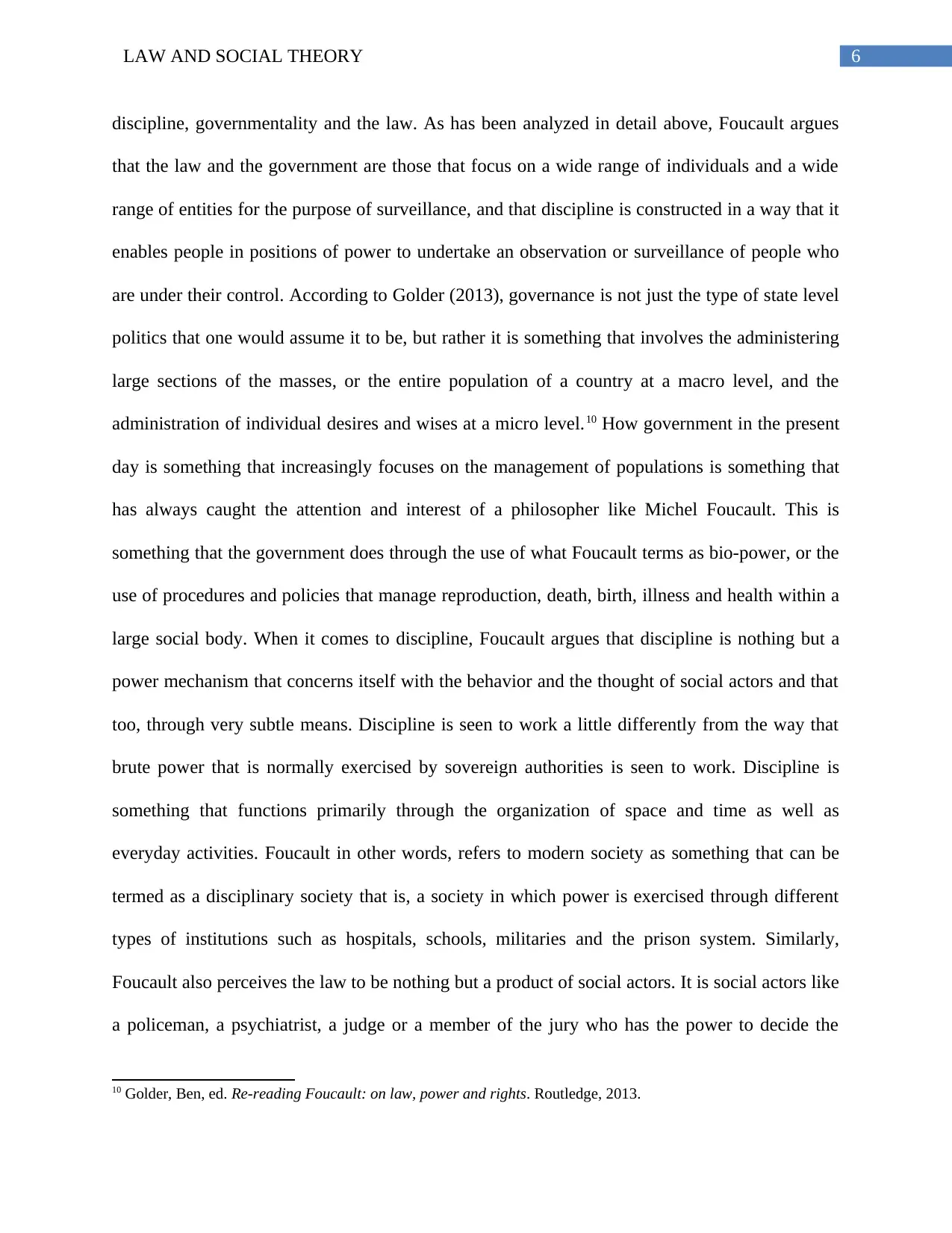
6LAW AND SOCIAL THEORY
discipline, governmentality and the law. As has been analyzed in detail above, Foucault argues
that the law and the government are those that focus on a wide range of individuals and a wide
range of entities for the purpose of surveillance, and that discipline is constructed in a way that it
enables people in positions of power to undertake an observation or surveillance of people who
are under their control. According to Golder (2013), governance is not just the type of state level
politics that one would assume it to be, but rather it is something that involves the administering
large sections of the masses, or the entire population of a country at a macro level, and the
administration of individual desires and wises at a micro level.10 How government in the present
day is something that increasingly focuses on the management of populations is something that
has always caught the attention and interest of a philosopher like Michel Foucault. This is
something that the government does through the use of what Foucault terms as bio-power, or the
use of procedures and policies that manage reproduction, death, birth, illness and health within a
large social body. When it comes to discipline, Foucault argues that discipline is nothing but a
power mechanism that concerns itself with the behavior and the thought of social actors and that
too, through very subtle means. Discipline is seen to work a little differently from the way that
brute power that is normally exercised by sovereign authorities is seen to work. Discipline is
something that functions primarily through the organization of space and time as well as
everyday activities. Foucault in other words, refers to modern society as something that can be
termed as a disciplinary society that is, a society in which power is exercised through different
types of institutions such as hospitals, schools, militaries and the prison system. Similarly,
Foucault also perceives the law to be nothing but a product of social actors. It is social actors like
a policeman, a psychiatrist, a judge or a member of the jury who has the power to decide the
10 Golder, Ben, ed. Re-reading Foucault: on law, power and rights. Routledge, 2013.
discipline, governmentality and the law. As has been analyzed in detail above, Foucault argues
that the law and the government are those that focus on a wide range of individuals and a wide
range of entities for the purpose of surveillance, and that discipline is constructed in a way that it
enables people in positions of power to undertake an observation or surveillance of people who
are under their control. According to Golder (2013), governance is not just the type of state level
politics that one would assume it to be, but rather it is something that involves the administering
large sections of the masses, or the entire population of a country at a macro level, and the
administration of individual desires and wises at a micro level.10 How government in the present
day is something that increasingly focuses on the management of populations is something that
has always caught the attention and interest of a philosopher like Michel Foucault. This is
something that the government does through the use of what Foucault terms as bio-power, or the
use of procedures and policies that manage reproduction, death, birth, illness and health within a
large social body. When it comes to discipline, Foucault argues that discipline is nothing but a
power mechanism that concerns itself with the behavior and the thought of social actors and that
too, through very subtle means. Discipline is seen to work a little differently from the way that
brute power that is normally exercised by sovereign authorities is seen to work. Discipline is
something that functions primarily through the organization of space and time as well as
everyday activities. Foucault in other words, refers to modern society as something that can be
termed as a disciplinary society that is, a society in which power is exercised through different
types of institutions such as hospitals, schools, militaries and the prison system. Similarly,
Foucault also perceives the law to be nothing but a product of social actors. It is social actors like
a policeman, a psychiatrist, a judge or a member of the jury who has the power to decide the
10 Golder, Ben, ed. Re-reading Foucault: on law, power and rights. Routledge, 2013.
Paraphrase This Document
Need a fresh take? Get an instant paraphrase of this document with our AI Paraphraser
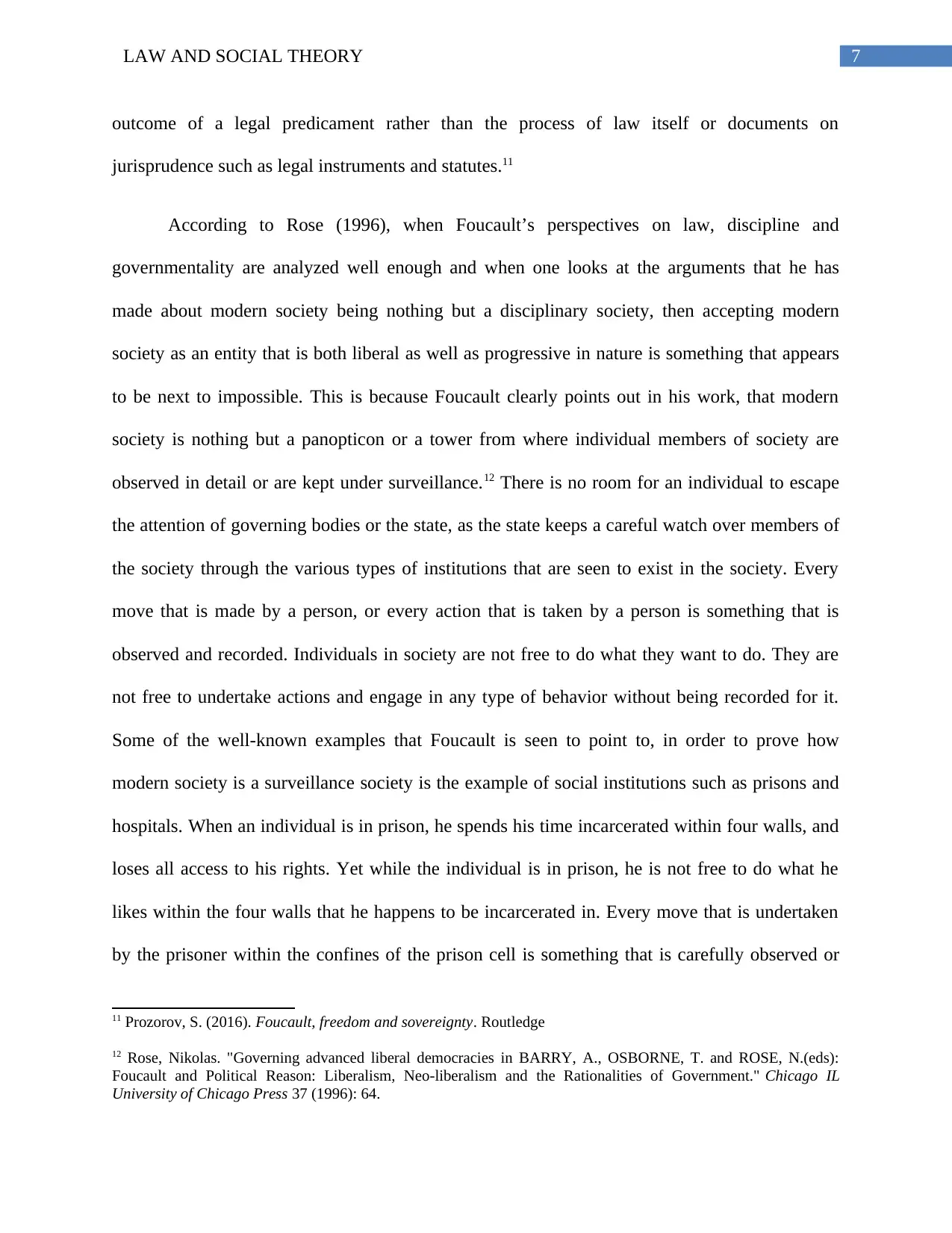
7LAW AND SOCIAL THEORY
outcome of a legal predicament rather than the process of law itself or documents on
jurisprudence such as legal instruments and statutes.11
According to Rose (1996), when Foucault’s perspectives on law, discipline and
governmentality are analyzed well enough and when one looks at the arguments that he has
made about modern society being nothing but a disciplinary society, then accepting modern
society as an entity that is both liberal as well as progressive in nature is something that appears
to be next to impossible. This is because Foucault clearly points out in his work, that modern
society is nothing but a panopticon or a tower from where individual members of society are
observed in detail or are kept under surveillance.12 There is no room for an individual to escape
the attention of governing bodies or the state, as the state keeps a careful watch over members of
the society through the various types of institutions that are seen to exist in the society. Every
move that is made by a person, or every action that is taken by a person is something that is
observed and recorded. Individuals in society are not free to do what they want to do. They are
not free to undertake actions and engage in any type of behavior without being recorded for it.
Some of the well-known examples that Foucault is seen to point to, in order to prove how
modern society is a surveillance society is the example of social institutions such as prisons and
hospitals. When an individual is in prison, he spends his time incarcerated within four walls, and
loses all access to his rights. Yet while the individual is in prison, he is not free to do what he
likes within the four walls that he happens to be incarcerated in. Every move that is undertaken
by the prisoner within the confines of the prison cell is something that is carefully observed or
11 Prozorov, S. (2016). Foucault, freedom and sovereignty. Routledge
12 Rose, Nikolas. "Governing advanced liberal democracies in BARRY, A., OSBORNE, T. and ROSE, N.(eds):
Foucault and Political Reason: Liberalism, Neo-liberalism and the Rationalities of Government." Chicago IL
University of Chicago Press 37 (1996): 64.
outcome of a legal predicament rather than the process of law itself or documents on
jurisprudence such as legal instruments and statutes.11
According to Rose (1996), when Foucault’s perspectives on law, discipline and
governmentality are analyzed well enough and when one looks at the arguments that he has
made about modern society being nothing but a disciplinary society, then accepting modern
society as an entity that is both liberal as well as progressive in nature is something that appears
to be next to impossible. This is because Foucault clearly points out in his work, that modern
society is nothing but a panopticon or a tower from where individual members of society are
observed in detail or are kept under surveillance.12 There is no room for an individual to escape
the attention of governing bodies or the state, as the state keeps a careful watch over members of
the society through the various types of institutions that are seen to exist in the society. Every
move that is made by a person, or every action that is taken by a person is something that is
observed and recorded. Individuals in society are not free to do what they want to do. They are
not free to undertake actions and engage in any type of behavior without being recorded for it.
Some of the well-known examples that Foucault is seen to point to, in order to prove how
modern society is a surveillance society is the example of social institutions such as prisons and
hospitals. When an individual is in prison, he spends his time incarcerated within four walls, and
loses all access to his rights. Yet while the individual is in prison, he is not free to do what he
likes within the four walls that he happens to be incarcerated in. Every move that is undertaken
by the prisoner within the confines of the prison cell is something that is carefully observed or
11 Prozorov, S. (2016). Foucault, freedom and sovereignty. Routledge
12 Rose, Nikolas. "Governing advanced liberal democracies in BARRY, A., OSBORNE, T. and ROSE, N.(eds):
Foucault and Political Reason: Liberalism, Neo-liberalism and the Rationalities of Government." Chicago IL
University of Chicago Press 37 (1996): 64.
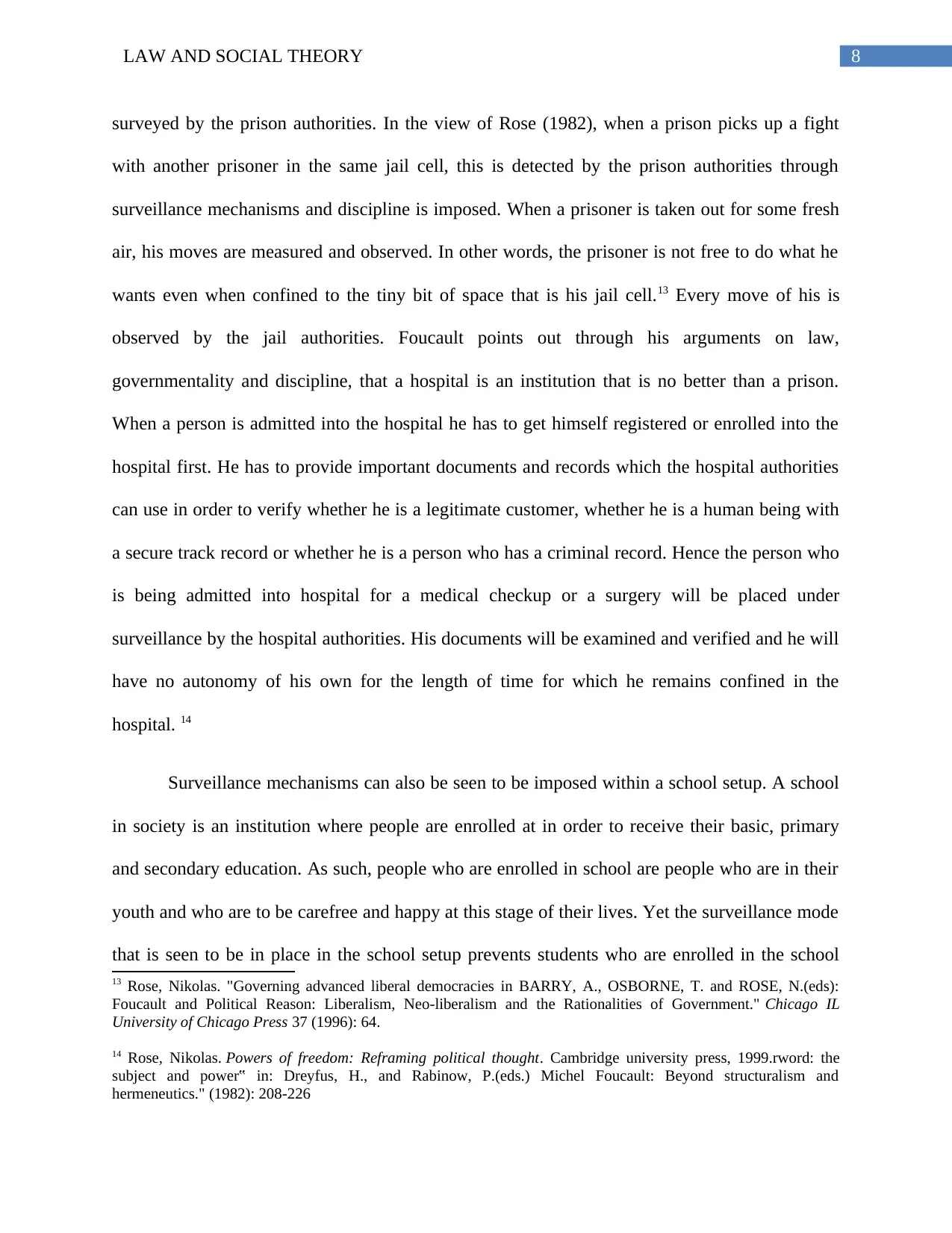
8LAW AND SOCIAL THEORY
surveyed by the prison authorities. In the view of Rose (1982), when a prison picks up a fight
with another prisoner in the same jail cell, this is detected by the prison authorities through
surveillance mechanisms and discipline is imposed. When a prisoner is taken out for some fresh
air, his moves are measured and observed. In other words, the prisoner is not free to do what he
wants even when confined to the tiny bit of space that is his jail cell.13 Every move of his is
observed by the jail authorities. Foucault points out through his arguments on law,
governmentality and discipline, that a hospital is an institution that is no better than a prison.
When a person is admitted into the hospital he has to get himself registered or enrolled into the
hospital first. He has to provide important documents and records which the hospital authorities
can use in order to verify whether he is a legitimate customer, whether he is a human being with
a secure track record or whether he is a person who has a criminal record. Hence the person who
is being admitted into hospital for a medical checkup or a surgery will be placed under
surveillance by the hospital authorities. His documents will be examined and verified and he will
have no autonomy of his own for the length of time for which he remains confined in the
hospital. 14
Surveillance mechanisms can also be seen to be imposed within a school setup. A school
in society is an institution where people are enrolled at in order to receive their basic, primary
and secondary education. As such, people who are enrolled in school are people who are in their
youth and who are to be carefree and happy at this stage of their lives. Yet the surveillance mode
that is seen to be in place in the school setup prevents students who are enrolled in the school
13 Rose, Nikolas. "Governing advanced liberal democracies in BARRY, A., OSBORNE, T. and ROSE, N.(eds):
Foucault and Political Reason: Liberalism, Neo-liberalism and the Rationalities of Government." Chicago IL
University of Chicago Press 37 (1996): 64.
14 Rose, Nikolas. Powers of freedom: Reframing political thought. Cambridge university press, 1999.rword: the
subject and power‟ in: Dreyfus, H., and Rabinow, P.(eds.) Michel Foucault: Beyond structuralism and
hermeneutics." (1982): 208-226
surveyed by the prison authorities. In the view of Rose (1982), when a prison picks up a fight
with another prisoner in the same jail cell, this is detected by the prison authorities through
surveillance mechanisms and discipline is imposed. When a prisoner is taken out for some fresh
air, his moves are measured and observed. In other words, the prisoner is not free to do what he
wants even when confined to the tiny bit of space that is his jail cell.13 Every move of his is
observed by the jail authorities. Foucault points out through his arguments on law,
governmentality and discipline, that a hospital is an institution that is no better than a prison.
When a person is admitted into the hospital he has to get himself registered or enrolled into the
hospital first. He has to provide important documents and records which the hospital authorities
can use in order to verify whether he is a legitimate customer, whether he is a human being with
a secure track record or whether he is a person who has a criminal record. Hence the person who
is being admitted into hospital for a medical checkup or a surgery will be placed under
surveillance by the hospital authorities. His documents will be examined and verified and he will
have no autonomy of his own for the length of time for which he remains confined in the
hospital. 14
Surveillance mechanisms can also be seen to be imposed within a school setup. A school
in society is an institution where people are enrolled at in order to receive their basic, primary
and secondary education. As such, people who are enrolled in school are people who are in their
youth and who are to be carefree and happy at this stage of their lives. Yet the surveillance mode
that is seen to be in place in the school setup prevents students who are enrolled in the school
13 Rose, Nikolas. "Governing advanced liberal democracies in BARRY, A., OSBORNE, T. and ROSE, N.(eds):
Foucault and Political Reason: Liberalism, Neo-liberalism and the Rationalities of Government." Chicago IL
University of Chicago Press 37 (1996): 64.
14 Rose, Nikolas. Powers of freedom: Reframing political thought. Cambridge university press, 1999.rword: the
subject and power‟ in: Dreyfus, H., and Rabinow, P.(eds.) Michel Foucault: Beyond structuralism and
hermeneutics." (1982): 208-226
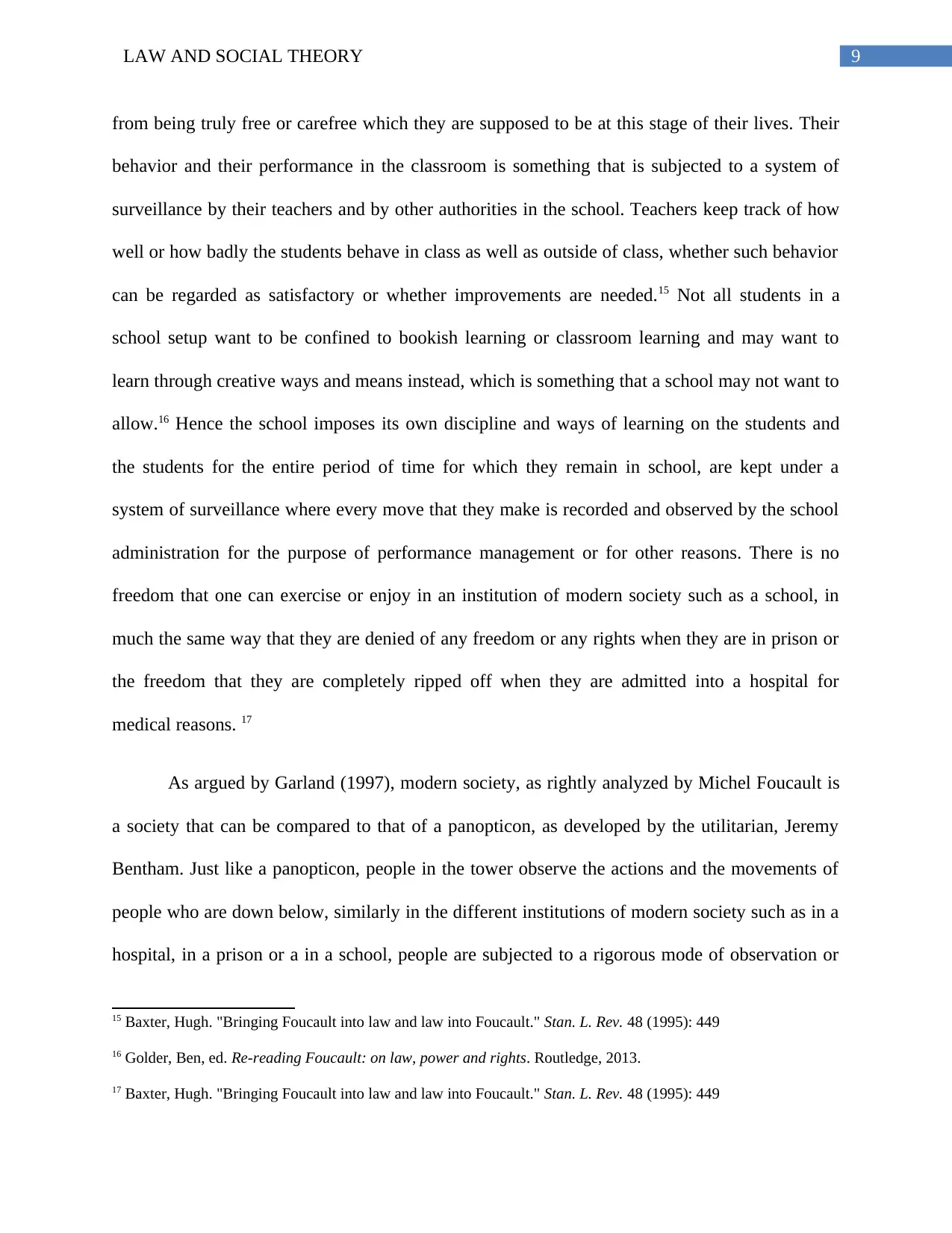
9LAW AND SOCIAL THEORY
from being truly free or carefree which they are supposed to be at this stage of their lives. Their
behavior and their performance in the classroom is something that is subjected to a system of
surveillance by their teachers and by other authorities in the school. Teachers keep track of how
well or how badly the students behave in class as well as outside of class, whether such behavior
can be regarded as satisfactory or whether improvements are needed.15 Not all students in a
school setup want to be confined to bookish learning or classroom learning and may want to
learn through creative ways and means instead, which is something that a school may not want to
allow.16 Hence the school imposes its own discipline and ways of learning on the students and
the students for the entire period of time for which they remain in school, are kept under a
system of surveillance where every move that they make is recorded and observed by the school
administration for the purpose of performance management or for other reasons. There is no
freedom that one can exercise or enjoy in an institution of modern society such as a school, in
much the same way that they are denied of any freedom or any rights when they are in prison or
the freedom that they are completely ripped off when they are admitted into a hospital for
medical reasons. 17
As argued by Garland (1997), modern society, as rightly analyzed by Michel Foucault is
a society that can be compared to that of a panopticon, as developed by the utilitarian, Jeremy
Bentham. Just like a panopticon, people in the tower observe the actions and the movements of
people who are down below, similarly in the different institutions of modern society such as in a
hospital, in a prison or a in a school, people are subjected to a rigorous mode of observation or
15 Baxter, Hugh. "Bringing Foucault into law and law into Foucault." Stan. L. Rev. 48 (1995): 449
16 Golder, Ben, ed. Re-reading Foucault: on law, power and rights. Routledge, 2013.
17 Baxter, Hugh. "Bringing Foucault into law and law into Foucault." Stan. L. Rev. 48 (1995): 449
from being truly free or carefree which they are supposed to be at this stage of their lives. Their
behavior and their performance in the classroom is something that is subjected to a system of
surveillance by their teachers and by other authorities in the school. Teachers keep track of how
well or how badly the students behave in class as well as outside of class, whether such behavior
can be regarded as satisfactory or whether improvements are needed.15 Not all students in a
school setup want to be confined to bookish learning or classroom learning and may want to
learn through creative ways and means instead, which is something that a school may not want to
allow.16 Hence the school imposes its own discipline and ways of learning on the students and
the students for the entire period of time for which they remain in school, are kept under a
system of surveillance where every move that they make is recorded and observed by the school
administration for the purpose of performance management or for other reasons. There is no
freedom that one can exercise or enjoy in an institution of modern society such as a school, in
much the same way that they are denied of any freedom or any rights when they are in prison or
the freedom that they are completely ripped off when they are admitted into a hospital for
medical reasons. 17
As argued by Garland (1997), modern society, as rightly analyzed by Michel Foucault is
a society that can be compared to that of a panopticon, as developed by the utilitarian, Jeremy
Bentham. Just like a panopticon, people in the tower observe the actions and the movements of
people who are down below, similarly in the different institutions of modern society such as in a
hospital, in a prison or a in a school, people are subjected to a rigorous mode of observation or
15 Baxter, Hugh. "Bringing Foucault into law and law into Foucault." Stan. L. Rev. 48 (1995): 449
16 Golder, Ben, ed. Re-reading Foucault: on law, power and rights. Routledge, 2013.
17 Baxter, Hugh. "Bringing Foucault into law and law into Foucault." Stan. L. Rev. 48 (1995): 449
Secure Best Marks with AI Grader
Need help grading? Try our AI Grader for instant feedback on your assignments.
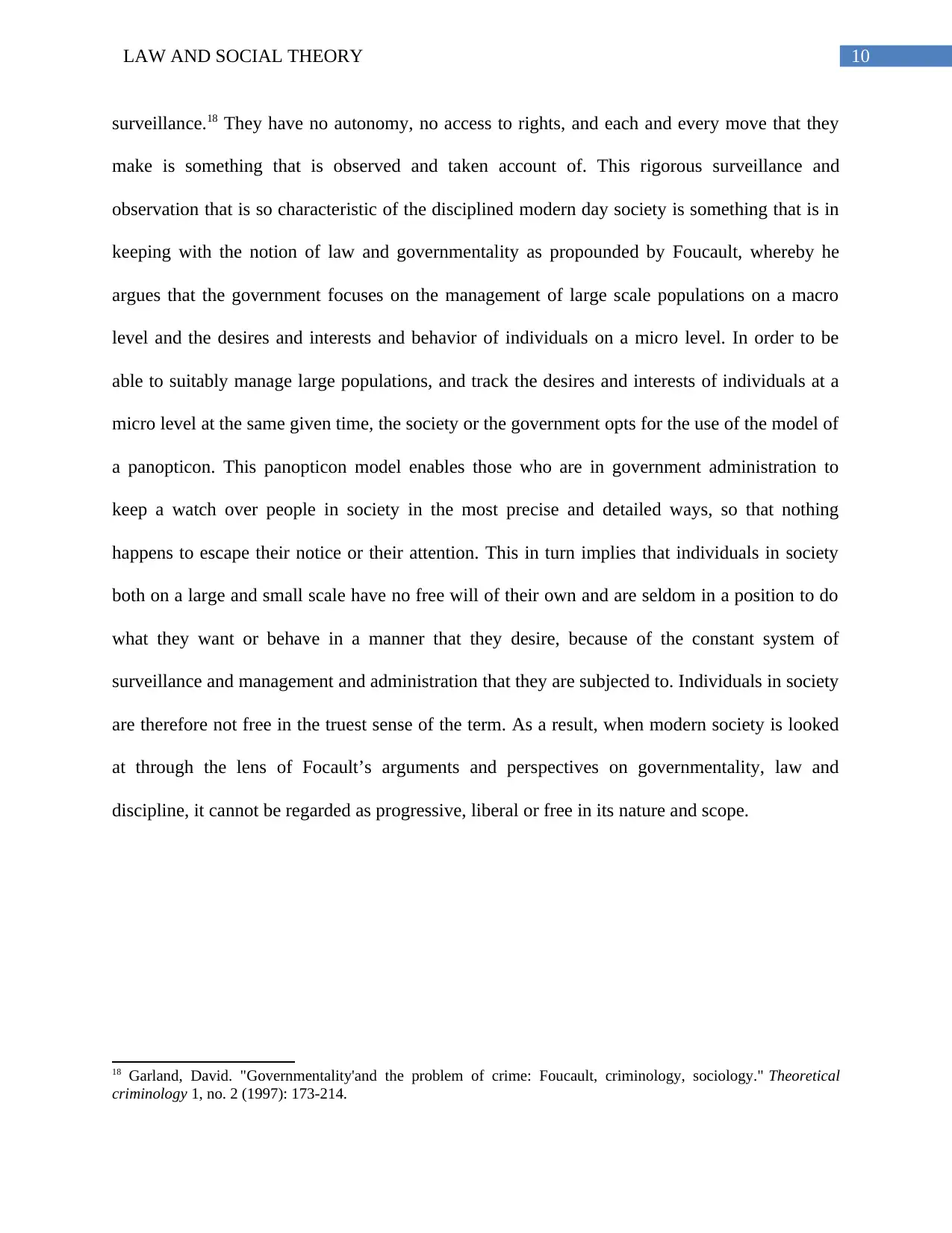
10LAW AND SOCIAL THEORY
surveillance.18 They have no autonomy, no access to rights, and each and every move that they
make is something that is observed and taken account of. This rigorous surveillance and
observation that is so characteristic of the disciplined modern day society is something that is in
keeping with the notion of law and governmentality as propounded by Foucault, whereby he
argues that the government focuses on the management of large scale populations on a macro
level and the desires and interests and behavior of individuals on a micro level. In order to be
able to suitably manage large populations, and track the desires and interests of individuals at a
micro level at the same given time, the society or the government opts for the use of the model of
a panopticon. This panopticon model enables those who are in government administration to
keep a watch over people in society in the most precise and detailed ways, so that nothing
happens to escape their notice or their attention. This in turn implies that individuals in society
both on a large and small scale have no free will of their own and are seldom in a position to do
what they want or behave in a manner that they desire, because of the constant system of
surveillance and management and administration that they are subjected to. Individuals in society
are therefore not free in the truest sense of the term. As a result, when modern society is looked
at through the lens of Focault’s arguments and perspectives on governmentality, law and
discipline, it cannot be regarded as progressive, liberal or free in its nature and scope.
18 Garland, David. "Governmentality'and the problem of crime: Foucault, criminology, sociology." Theoretical
criminology 1, no. 2 (1997): 173-214.
surveillance.18 They have no autonomy, no access to rights, and each and every move that they
make is something that is observed and taken account of. This rigorous surveillance and
observation that is so characteristic of the disciplined modern day society is something that is in
keeping with the notion of law and governmentality as propounded by Foucault, whereby he
argues that the government focuses on the management of large scale populations on a macro
level and the desires and interests and behavior of individuals on a micro level. In order to be
able to suitably manage large populations, and track the desires and interests of individuals at a
micro level at the same given time, the society or the government opts for the use of the model of
a panopticon. This panopticon model enables those who are in government administration to
keep a watch over people in society in the most precise and detailed ways, so that nothing
happens to escape their notice or their attention. This in turn implies that individuals in society
both on a large and small scale have no free will of their own and are seldom in a position to do
what they want or behave in a manner that they desire, because of the constant system of
surveillance and management and administration that they are subjected to. Individuals in society
are therefore not free in the truest sense of the term. As a result, when modern society is looked
at through the lens of Focault’s arguments and perspectives on governmentality, law and
discipline, it cannot be regarded as progressive, liberal or free in its nature and scope.
18 Garland, David. "Governmentality'and the problem of crime: Foucault, criminology, sociology." Theoretical
criminology 1, no. 2 (1997): 173-214.
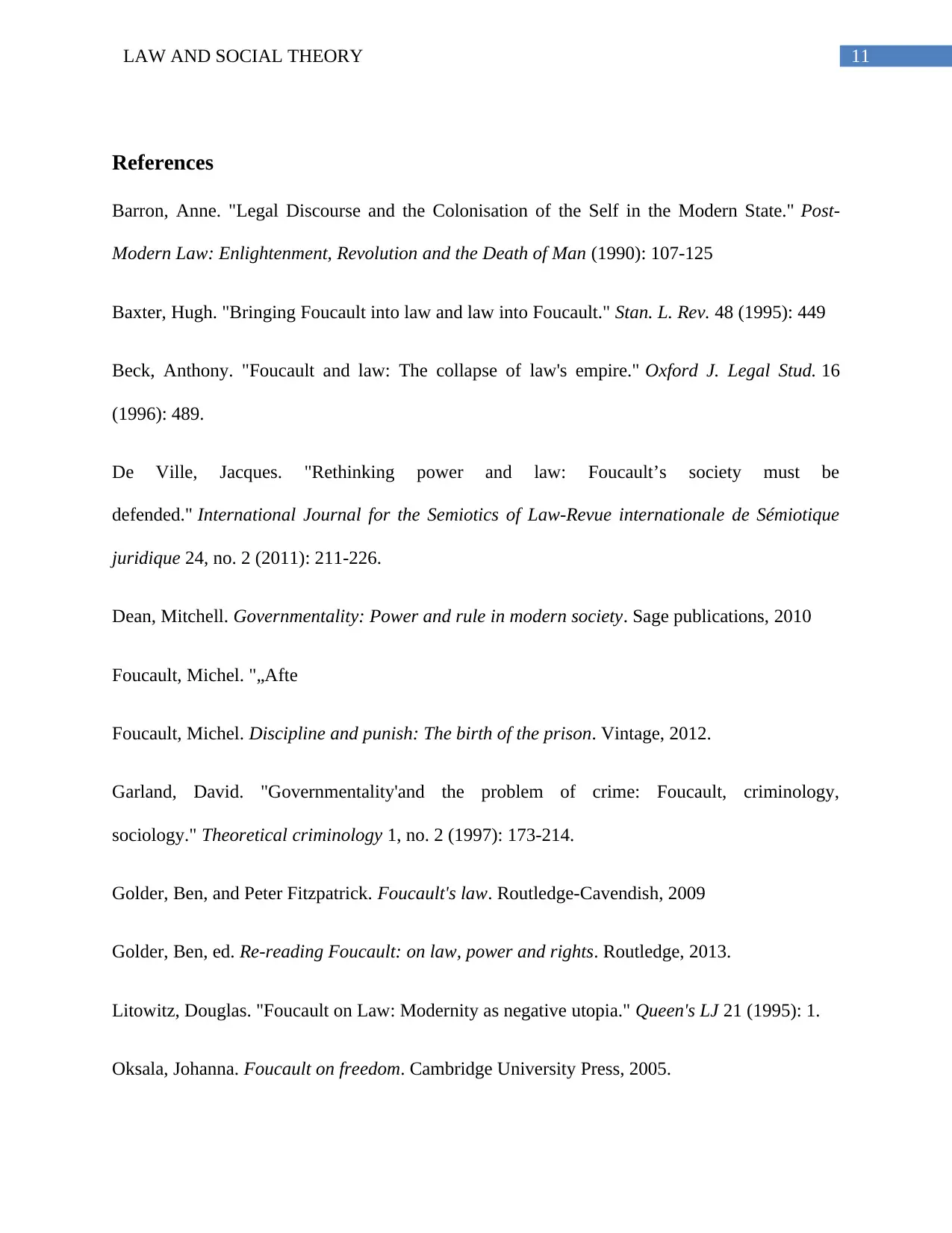
11LAW AND SOCIAL THEORY
References
Barron, Anne. "Legal Discourse and the Colonisation of the Self in the Modern State." Post-
Modern Law: Enlightenment, Revolution and the Death of Man (1990): 107-125
Baxter, Hugh. "Bringing Foucault into law and law into Foucault." Stan. L. Rev. 48 (1995): 449
Beck, Anthony. "Foucault and law: The collapse of law's empire." Oxford J. Legal Stud. 16
(1996): 489.
De Ville, Jacques. "Rethinking power and law: Foucault’s society must be
defended." International Journal for the Semiotics of Law-Revue internationale de Sémiotique
juridique 24, no. 2 (2011): 211-226.
Dean, Mitchell. Governmentality: Power and rule in modern society. Sage publications, 2010
Foucault, Michel. "„Afte
Foucault, Michel. Discipline and punish: The birth of the prison. Vintage, 2012.
Garland, David. "Governmentality'and the problem of crime: Foucault, criminology,
sociology." Theoretical criminology 1, no. 2 (1997): 173-214.
Golder, Ben, and Peter Fitzpatrick. Foucault's law. Routledge-Cavendish, 2009
Golder, Ben, ed. Re-reading Foucault: on law, power and rights. Routledge, 2013.
Litowitz, Douglas. "Foucault on Law: Modernity as negative utopia." Queen's LJ 21 (1995): 1.
Oksala, Johanna. Foucault on freedom. Cambridge University Press, 2005.
References
Barron, Anne. "Legal Discourse and the Colonisation of the Self in the Modern State." Post-
Modern Law: Enlightenment, Revolution and the Death of Man (1990): 107-125
Baxter, Hugh. "Bringing Foucault into law and law into Foucault." Stan. L. Rev. 48 (1995): 449
Beck, Anthony. "Foucault and law: The collapse of law's empire." Oxford J. Legal Stud. 16
(1996): 489.
De Ville, Jacques. "Rethinking power and law: Foucault’s society must be
defended." International Journal for the Semiotics of Law-Revue internationale de Sémiotique
juridique 24, no. 2 (2011): 211-226.
Dean, Mitchell. Governmentality: Power and rule in modern society. Sage publications, 2010
Foucault, Michel. "„Afte
Foucault, Michel. Discipline and punish: The birth of the prison. Vintage, 2012.
Garland, David. "Governmentality'and the problem of crime: Foucault, criminology,
sociology." Theoretical criminology 1, no. 2 (1997): 173-214.
Golder, Ben, and Peter Fitzpatrick. Foucault's law. Routledge-Cavendish, 2009
Golder, Ben, ed. Re-reading Foucault: on law, power and rights. Routledge, 2013.
Litowitz, Douglas. "Foucault on Law: Modernity as negative utopia." Queen's LJ 21 (1995): 1.
Oksala, Johanna. Foucault on freedom. Cambridge University Press, 2005.
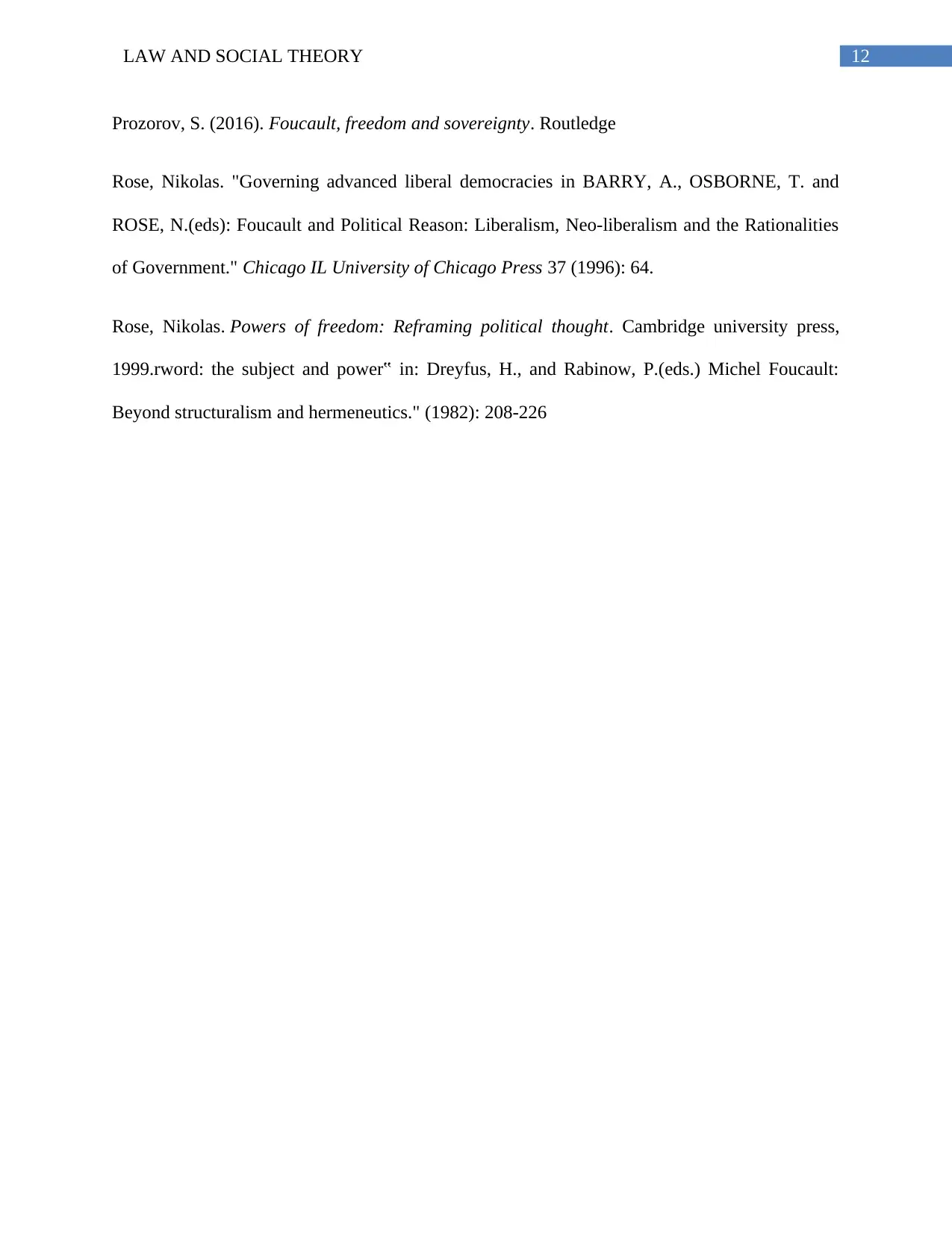
12LAW AND SOCIAL THEORY
Prozorov, S. (2016). Foucault, freedom and sovereignty. Routledge
Rose, Nikolas. "Governing advanced liberal democracies in BARRY, A., OSBORNE, T. and
ROSE, N.(eds): Foucault and Political Reason: Liberalism, Neo-liberalism and the Rationalities
of Government." Chicago IL University of Chicago Press 37 (1996): 64.
Rose, Nikolas. Powers of freedom: Reframing political thought. Cambridge university press,
1999.rword: the subject and power‟ in: Dreyfus, H., and Rabinow, P.(eds.) Michel Foucault:
Beyond structuralism and hermeneutics." (1982): 208-226
Prozorov, S. (2016). Foucault, freedom and sovereignty. Routledge
Rose, Nikolas. "Governing advanced liberal democracies in BARRY, A., OSBORNE, T. and
ROSE, N.(eds): Foucault and Political Reason: Liberalism, Neo-liberalism and the Rationalities
of Government." Chicago IL University of Chicago Press 37 (1996): 64.
Rose, Nikolas. Powers of freedom: Reframing political thought. Cambridge university press,
1999.rword: the subject and power‟ in: Dreyfus, H., and Rabinow, P.(eds.) Michel Foucault:
Beyond structuralism and hermeneutics." (1982): 208-226
1 out of 13
Your All-in-One AI-Powered Toolkit for Academic Success.
+13062052269
info@desklib.com
Available 24*7 on WhatsApp / Email
![[object Object]](/_next/static/media/star-bottom.7253800d.svg)
Unlock your academic potential
© 2024 | Zucol Services PVT LTD | All rights reserved.